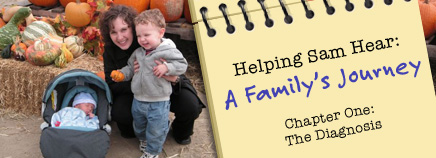
The audiologist rechecked the connections and made sure the earpieces were still firmly positioned in Sam’s ears. Even as the noise being pumped directly into his head became audible to the rest of us, our infant son slept.
Limp lines crossed the computer screen for half an hour, and I got the sinking feeling the audiologist only continued to stare at them to avoid making eye contact with my wife and me. She was preparing herself to share bad news.
Only 3 months earlier, our second child, Sam, was born and we enjoyed one of the happiest days of our lives. This day was one of the saddest. The fear that we both carried but largely avoided discussing was confirmed: Sam was deaf.
Now, Sam is almost a year old and we’re quickly approaching the day he will receive a cochlear implant. It’s an exciting time for our family. The pain we felt on the January morning when his hearing loss was confirmed faded as we learned about hearing loss and how the implant could help Sam navigate a hearing world. Information has been our lifeblood, and we hope sharing our story benefits others who face similar situations.
A New Reality
With no family history of hearing loss, my wife, Teresa, and I never considered the possibility that we might have a child who was deaf. And when Sam failed his newborn screening the day after he was born, the woman who performed the test told us inaccurate results were common.
A month later, Sam failed another screening at our pediatrician’s office. The audiologist explained that the parts of Sam’s inner ear worked, but the equipment wasn’t showing a response from the tiny hair cells inside his cochlea. Leftover fluid from birth was the likely culprit, he said.
Any explanation seemed reasonable because the idea that our son could have a significant hearing loss seemed so unreasonable. Still, we were coming to grips with that reality. Medical professionals, family, and friends all asked the same question: Does he respond to loud noises at home? Each time we answered that question we were forced to be a little more honest with ourselves.
Whether Teresa yelled his name from across the room or I clapped my hands just behind his head, Sam never budged. We debated his blinks and gestures, but we were just being wishful. That became clear at the third hearing screening, when the audiologist was noticeably somber. There were no new possible explanations to consider this time, just a recommendation that we make an appointment with a children’s hospital for a more involved test.
On January 9, we arrived at the hospital for an ABR (auditory brainstem response) test. The audiologist escorted us from the waiting area to a dimly lit room filled with computer equipment and wires. In a soft voice, she explained the test and told us it would take about an hour. It didn’t.
Her demeanor was a comfort as we settled in for the test, but as the test wore on we could read the growing disappointment in her face. Teresa was sobbing and I was choking back tears as the audiologist turned to us to explain the outcome.
The test measured Sam’s brain waves in response to sound at various volumes and pitches. He showed no response. That means he never heard his mother’s lullabies or his 2-year-old brother’s laugh. In fact, based on the results, Sam wouldn’t hear a freight train if he were close enough to feel the wind on his face as it rushed past. The audiologist said it differently, but those were the harsh facts as I saw them.
Teresa and I asked about everything from the finer points of the word “profound” to the reliability of the testing equipment, even though we knew better. After a few minutes, the audiologist excused herself to give my wife and me time alone. We held a tight embrace and cried.
Sorrow, Guilt, and Fear
We had been through the common ups and downs of being new parents, but this was our first experience with full-fledged parental anguish. We were wounded and helpless, afraid to leave the room. Sorrow, guilt, and fear filled my mind as I thought about how ill-equipped we were to help Sam.
“It’s not fair,” my wife said between bouts of tears. She searched for answers where there were none: Was it the glass of champagne she drank before knowing she was pregnant? Could it have been the cream the dermatologist prescribed for a rash? Or was it the delivery itself? To me, determining the cause seemed less important than figuring out what to do.
What would we do? Sam seemed like a different baby. We loved him just as much as before, but we weren’t sure how to help him. We hugged him, kissed him, put him back in his car seat and, with business cards, reading material, and videos in hand, began to make our way out of the hospital.
We shed a lot of tears over the next few days as we told and retold the news. We began meeting with various medical professionals almost immediately. Family and friends called and visited, helping us get back into a normal rhythm.
One visitor, my brother-in-law, got me to laugh for the first time by reflecting on when his daughter got a liver transplant. “Do people tell you God doesn’t give you any more than you can handle?” he asked, hitting on a line of encouragement Teresa and I had heard more than once. “I used to say, ‘If that’s true, He must have me confused with someone else.’ ”
It was the perfect way to describe how my wife and I felt as our journey with Sam began.

